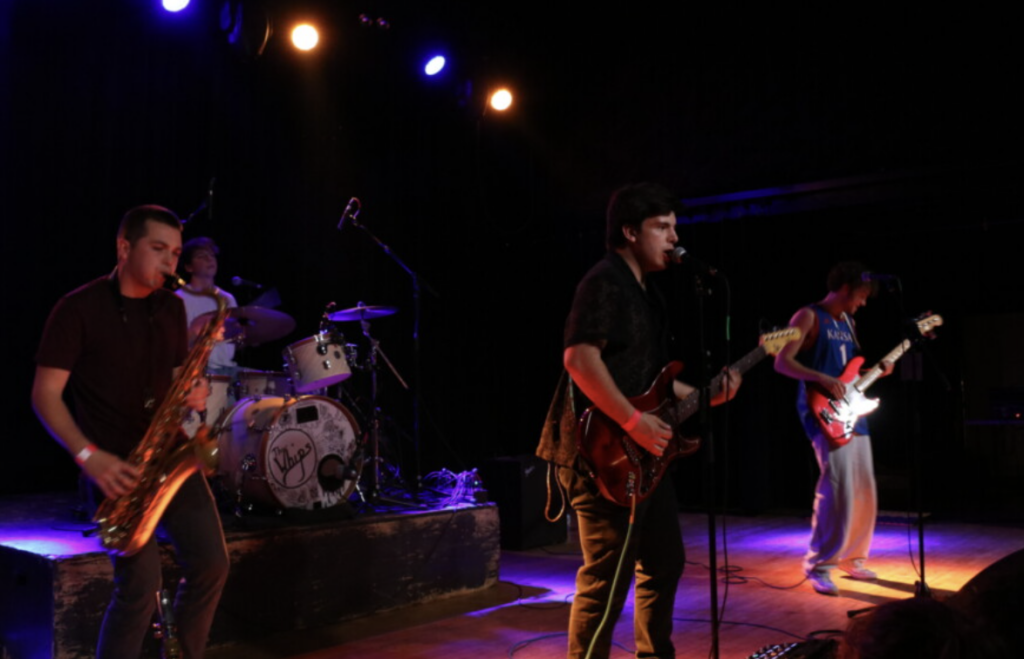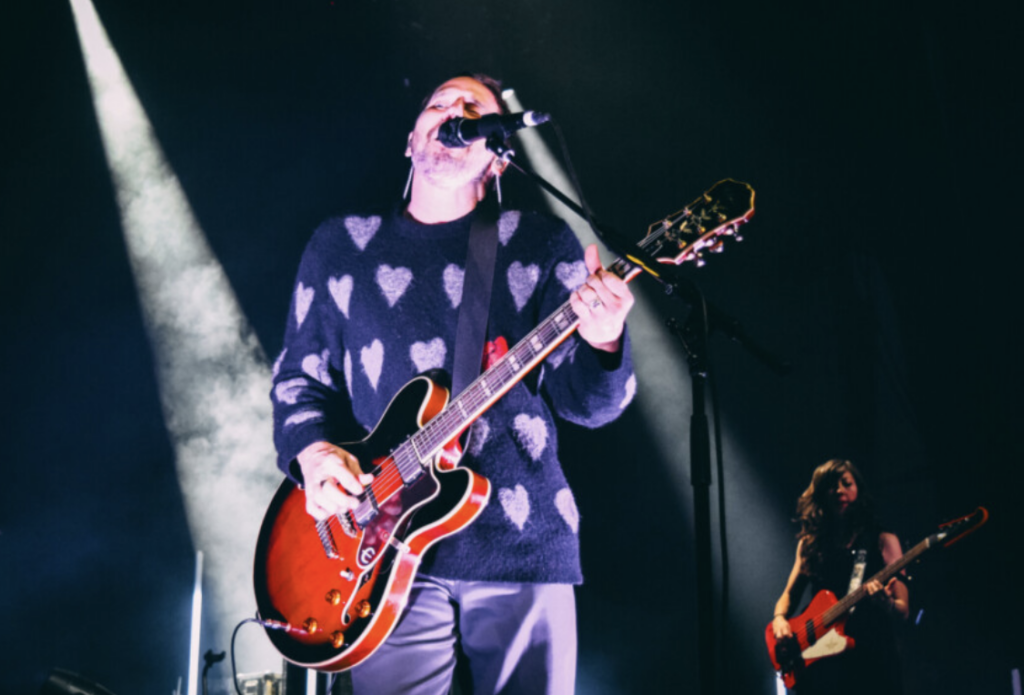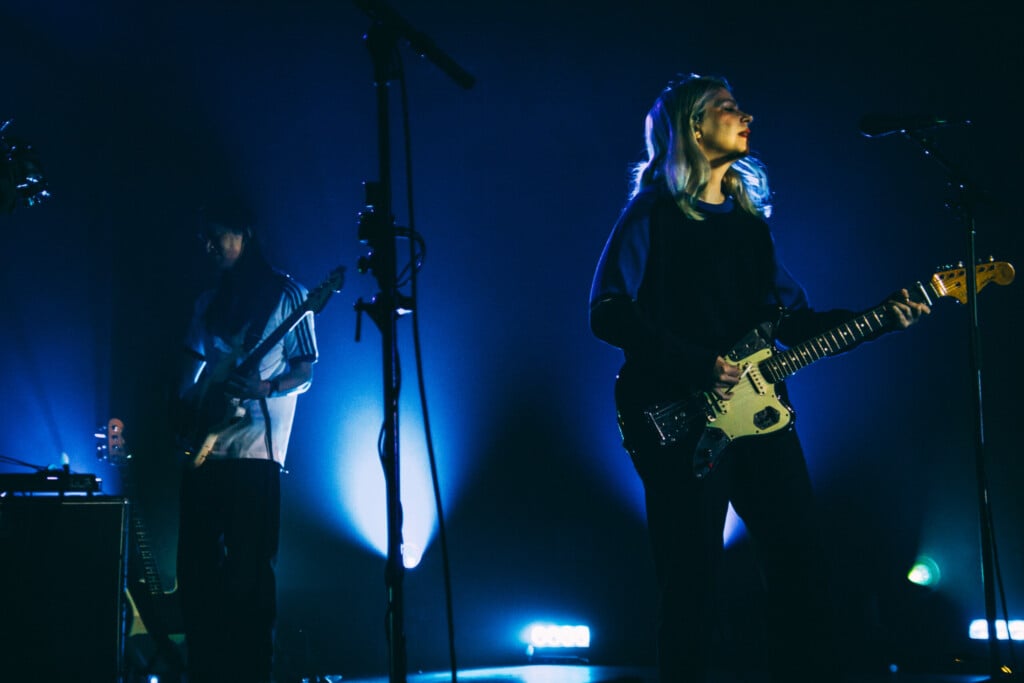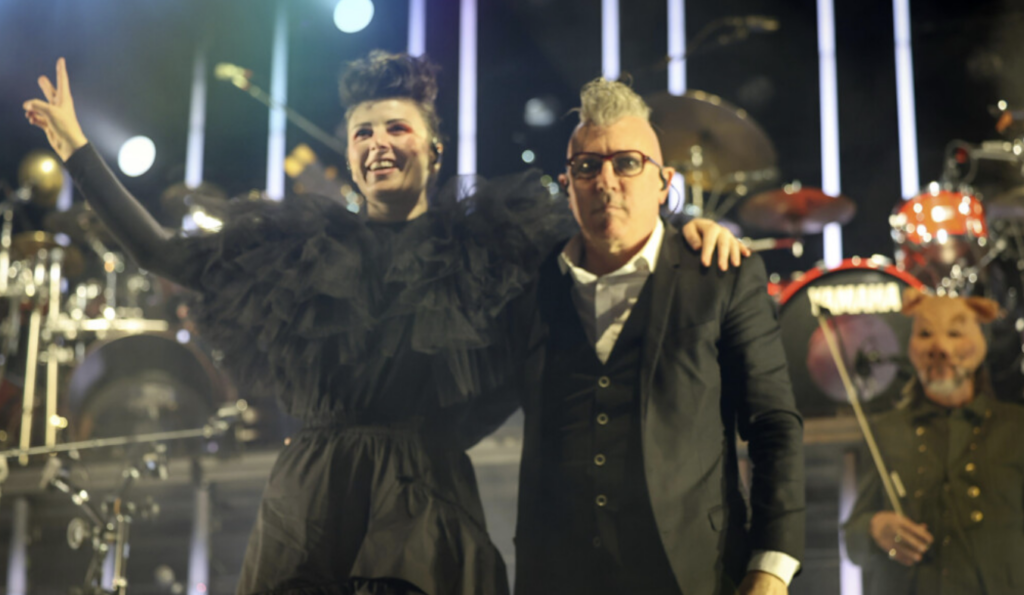No Skips: Running through Blue October’s Spinning the Truth Around, Pt. II while Justin Furstenfeld walks through a mall
In our series No Skips, we sit down with an artist or band and go track-by-track through their latest release. For some of us, the banter in a concert where a song gets explained is our favorite thing in the world, and we’d just like to keep living in that. Every song has a story, and these are those stories in the order you’ll encounter them on the record.
Nearing the end of Blue October’s spring tour for their newest record, we spoke with vocalist Justin Furstenfeld to talk about their 2023 LP, Spinning the Truth Around, Pt. II, how the band has changed since their 2006 hit song “Hate Me,” his new collaborators and more, all while Furstenfeld traversed a mall somewhere up north a day before their Minneapolis show.
The Pitch: Why the triple album? Is this something you think is worth risking because of what you have built as a catalog over the last three decades?
Justin Furstenfeld: Part III is just literally all of my favorite Blue October songs that I always wanted to be reproduced by some of my friends who are club remixers. It’s songs off of this album, songs off of Part I, songs off of I Hope You’re Happy, and they’re all put to banger beats. It’s completely reimagined and it just really hits hard.
I live in my studio, it’s on my property. I run Up/Down Records, our record label, too, so everything is in-house on this little six-acre compound that I built years ago. It has a studio, it has working engineers that are always there, it has producers that are paid to sit there and just create with me every freaking day. So even when I’m gone on tour I have people creating there, so when I get back I have a plethora of music to choose from so I can just start on music. During COVID, we had all these people just working. Me, Eric Holtz, Steve Schiltz, a guy named Feathers, we wrote so much material. We had probably 80-something songs and they were all completely done.
So it’s not like this, ‘Let’s put together this huge, Part I, Part II, it’s gonna tell the story.” I just had a shitload of songs. I didn’t want to put them all out on one album and people get sick of it. Everybody knows there’s only a buzz about your album these days for about a month and then it backs off. So I thought I’d put one out, tour for it for a year, put another one out, tour for it for a year, and then put the Part III out, which is just a positive uplift of what usual Blue October is, just really upbeat banging music. A kind of, ‘Thank you guys for all the years of support.’ Then take a quick break and come out with the next record. It was just a project of COVID. It was so many songs and not wanting to put them all out on one so that any of them would get overlooked.
Explain the choice to have a lot of stripped down cuts in the mix. I’m hearing a lot of people say this has more in common with This Is What I Live For than the Part 1 of this two parter. What are your thoughts on that?
I’ve always been into, I guess I wouldn’t say hip-hop or pop, but more of like Frank Oceany kind of R&B. R&B but with some really sad boy atmospheric music. I really love that kind of production. That’s Part I, the actual pop essence that I’ve always wanted to make, where the beats just really pop hard, but the songs are really sad and jazzy. Most of them are sampled off of old jazz records because I love sampling off of old vinyl onto MPC Akais, like the ‘80s. I don’t really like to sample off of Pro Tools because it’s too easy. I like the art of sampling off of vinyl, it’s just fun. I like to drink lots of espresso, just go in there, and just sample rate things. That one was sort of a self-produced, Louis Bell, Post Malone-y kind of album.
Then came Part II, which I wanted to start rocking up a little bit. So the guitars were turned up, the drums were turned up. It was really vibey. It went back to that whole New York kind of rock style, which is really similar to This Is What I Live For. Now we’re onto the newer stuff and it’s the heaviest, as far as heavy rock, that we’ve ever done. I never really got to make that sad boy heavy, heavy rock album. I really want to do that, but not make it sound like butt rock.
Your lyrics are really interesting as an artist. Usually, this type of approach can fall flat and most people will try for more obscure, cryptic and poetic attempts, but I think the candor with which you write in a “put all my thoughts on a page” way just shines through really successfully. Has your approach changed over time and was there ever a time when you were scared to write so bluntly? It can go badly so easily, but you have managed to not have a poorly received record yet. Are the things that you are listening to what you are inspired by, or are those separate?
It’s really kind of separate from how I write. I’ve always thought that the most extraordinary people that I’ve ever known, read about and listened to were the people that didn’t care if you didn’t like their negative shit. All their mistakes were already out, all their downfalls were already out. Yeah, I know I already have a zit on my forehead so why are you telling me I’ve got one? That kind of thing. Yeah, I know I’m overweight. So what the fuck? It’s more like that for poetry. I think once people start worrying about how they’re perceived by other people, that’s when it turns into a fashion show or an ego show, more than putting art out for the sake of it being real.
I’ve always said, ‘Just name the elephant in the room and then you can talk about whatever’s around that elephant, but if you try to talk about the elephant without telling anybody that the elephant’s there, you’re going to look like a fake.’ Life is so good once you admit to your mistakes and you’ve got nothing to hide, it’s free game. You can write about anything that you want because nobody can come back and say, ‘Well, you were an asshole.’ Yeah, I know, that was on album two. I already said that. It’s pretty beautiful, the things that you can write about when you’ve got nothing to hide.
How has life changed for you since the “Hate Me” days in 2006? You have released eight records since then, without a song as big as that, but have built a very tight rapport of fans that follow you wherever you go.
I don’t think we’ll ever have a song that gets as big as that, which is cool with me, but I sure am glad we were able to keep the vibe and honesty working. Styles will change, and unless you’re like Justin Bieber, Post Malone, or The Weeknd, and you’ve got multi-million dollar corporations behind you, then you can keep popping them out like that, but I don’t want to do that. I’d rather just make art so that if I want to stop for a second, I can.
I definitely have to say that my sobriety is a huge factor in us succeeding. After “Hate Me,” my songwriting went to shit for a while because I was very addicted to methamphetamines and opiates. I had a very bad drug problem. I still do, but I just don’t use them anymore. So I think my sobriety and finding recovery really challenged me to tap back into where I began my love for music. And that was through bands like The Cure, Idaho, Red House Painters, The Smiths, Cocteau Twins, weird people like that. Tom Waits, Leonard Cohen. They didn’t have to explain why they did it, they just did it. And the people that loved it stayed, and the people that didn’t, that’s fine. I’d rather be the boutique shoe salesman on the corner that everybody knows they can go to if they need something different than the Nike store down the street.
Explain the choice of opening the record with “I don’t need shit” and “I make money, fuck you.” Two very explicit lines in the first three. Was this a very conscious choice to set the tone for the album or was this just necessary for the song at-hand?
I would have to say that it was necessary for where I was in life because a lot of things had changed in my life personally. If you put your life out there, like I’ve always done, you’re going to always have people following you around telling you “You fucked up, you’re a fucking loser, etc.” They don’t see your life going the way they planned it to. Some people might get their little hearts hurt. So they’ll say awful things. I wanted to set the bar of, “This is who I am now and no one will make me feel less than.” The only thing to do is take care of my kids, so fuck you. That’s where those lines come from.
To be honest with you, I don’t let anything hurt me anymore because I’ve already gone through recovery. I’m 12 years sober, I’ve already made the amends I need to make, and I just don’t allow negative, toxic people in my life anymore. That was the tone. After writing Part I about break-up and things falling apart, it was the perfect tone for me. It’s okay, whatever you say, nothing hurts me. The only thing I need to worry about is making money for my kids, so fuck you. That’s it. It’s a good way to start the album, and it’s a good way for people that live in that realm of “What an asshole to just accept it.” Okay, maybe he is an asshole. Maybe they’ll move on.
This is one of very few all-out rockers on the record, so it’s obvious why you wanted to start the record with it. Talk about the guitar contributions here. I saw there were a number of people on guitar on the personnel page on Wikipedia.
Steve Schiltz is the one we should talk about. He’s our new guitarist. He’s played with Longwave and The Strokes. He’s been my songwriting partner for quite some time. He’s written songs like “I Hope You’re Happy” and “All That We Are,” among many others. But he is the shredder on that song and it’s such a cool solo that he did, and such a cool way to play that. It was like Queen meets Radiohead, he really ripped it.
“All I See Is You” quiets things down a tad with some reverberating strings throughout. With a couple more anthems coming up, was the idea to have something like this in between “Sideways” and “Sobriety/Leave Room For A Miracle?” Explain the connection between “There’s perks ’til the money’s gone” and “all I see is you.”
The good thing about “All I See Is You” is it goes straight from “Let me set my boundaries” to “This is what my life’s about now.” There was a very poignant moment in my life, about two years ago, when I met this person. I was walking around with them and they looked at me and said, “I don’t need you to buy me anything, I just want to hang out with you.” That’s the first time I’ve ever been with a girl who felt like that. Being in recovery and being sober, I’ve never really had a lot of intimacy or connection because I’ve always wanted drugs instead of relationships. So this was the first time I ever went on a date, and I thought you just go buy them stuff because I’m an idiot. She just stopped me and said ,“I don’t want you to buy me things, I just want to hang out. Let’s go get a coffee.”
That quote from that person changed my view on life. Insanely. That’s when I wrote that music with Eric. “I don’t want you to buy me nothing/I just wanna hang out with you.” And the chorus, “There’s perks ‘til the money’s gone.” Money is such a fucked up thing and I didn’t realize how fucked up it made people. When I met this person, it was such a breath of fresh air that someone wanted to actually get to know me, aside from Blue October and aside from just going out and buying things.
Do you think “Sobriety” is a representation of what this band has become in the last 17 years, given your publicized struggle with alcohol and drug addiction? This feels more earnest and honest than any track in your recent era.
I love “Sobriety” because it shows how far the band has come together as a unit. The lyrics are so fucking simple, I just love it. The song was called “Peace I’m Seeking,” until the very last minute. I was talking to someone and they were like, “Man, if you really think about it, it’s like recovery.” It was one of my friends in my AA group. They were like, “When I heard that demo, I thought you were talking about getting sober and staying sober. That’s the whole song for me. And then at the end it’s just this rocking jam like you’re staying sober and life is good.” I was just like, “Holy fuck!” It just blew my mind, that made so much more sense.
But as a band, I’m really proud of everybody. Especially Steve, coming into the band so late. They were just killing it with all these crazy ass sounds. Jeremy Furstenfeld on the drums, Matt Noveskey on the bass. It’s just insane. They’re great guys and I’m just so grateful.
The build on this one is fantastic. It begins with some restraint, moves to some shimmering electronics, then to some gritty guitars and bass. What was the goal with this one stylistically?
I always wanted to be Radiohead, but I’m not Radiohead. I always loved the way they could jam and not sound like a butt rock band, but sound like you’re listening to a movie almost. That was the point. I didn’t want any room sound on the drums, I didn’t want anything bombastic, I wanted everything tight. Even if you’re listening to it loud, it’s still pleasing to the ears. I wanted Steve’s guitar to sound like paint. It was the last thing we put on it. All those weird sounds, it’s him, he paints all over the song. It’s pretty freaking amazing when he does that.
The instrumentation of “Magic Isn’t Real” feels really energetic compared to the rest of the album. Explain the line, “I filled myself with grief to think this isn’t real.”
It’s, once again, my lack of knowledge with being intimate with someone, because I was always more concentrated on either business or drugs. And then having a marriage fail and go, “Oh wow, how do you meet someone? What is this going to be like? This is crazy, I’ve never done this sober before.”
That line was written by Eric Holtz, he’s my side guy. He’s my main producer and engineer back at home, he’s my right arm. He came back and said, ‘Check this out,’ and I was like, ‘Yeah, we’re keeping it.’ So he knows a way to talk about what I feel even when I’m on the road. He wrote that chorus and I was like, ‘Damn’ It’s pretty lucky to be working with Eric.
Talk about the linking of the end of this track with “Leave Room For A Miracle.” They don’t fully interconnect, but the beginning of “Leave” kind of feels like a coda to “Magic.”
Yeah, they’re both just raw songs, there’s not that many tracks in either one of them. I play the acoustic on one of them and the electric on the other, there’s not a bunch of synth. It just feels like a Tom Petty track with some balls under it. It’s such a good, pleasant song. I wanted it to be a definition of me. People say, ‘Why the fuck are you in such a good mood?’ Because I’ve got life! Life is good, my kids are healthy, I play music for a living. What the fuck is the problem? There’s not one. Oh my god, this is fucking amazing. Leave room for a miracle, stop worrying about the bullshit. Life is good.
“Leave Room” is a basic cut on a record filled with lyrical nuggets. Did you want this type of song here on the record and were you thinking of this as a single?
I love that song. I never thought of it as a single, because alternative radio these days doesn’t like acoustic guitars right now, but I could go back. I run the label, I could always go back and re-release it. We’d just edit it. I like it because it’s just so damn simple. Every time I play it live, people just sing loudly. It’s one of those, ‘I won’t get back down.’ Leave room for a miracle. Stop being a bitch, stop whining. Get off of social media, get off Facebook, go outside, talk, smile. Wish somebody a good day, buy them a cookie. Fuck.
In recovery I’m taught to recognize miracles every day. You have to find some sort of miracle every day, whether it’s in a person, anything going on, you have to find it. You kind of have to leave room to be able to find it. You can’t fill your day up with just so much shit that you forget that the reason we’re here is to be happy, joyous, and free. Not to be cluttered with shit, stressed out, and late for a meeting. So you have to leave room, you have to open yourself up, you have to be vulnerable to recognize beautiful things like the rain, or helping a person, or buying someone a coffee, or telling someone that their hair looks amazing when you can obviously see they’re insecure about it. It’s just the same things, bro. People make things so fucking complicated.
I really like the line, “There’s no more holding on, you’re falling to begin” in “Last Look Moving Forward.” “You’d be good if it were up to me” kind of unlocks the track a bit. Talk about the chorus here.
“Last Look Moving Forward” is about a relationship that I was in and wishing them well because there’s no reason to be negative about any of it. Just be caring, you want to wish everybody well. You don’t want to be rude, there’s no time for it, there’s no need for it.
It’s kind of painting the picture of, ‘This was a great thing, I’ve gone through it, I wish you well, and we have to move on now.’ And if you don’t wish them well, then you’re an asshole.
“Down Here Waiting” returns the rocker vibes from “Sideways” a bit, with probably the catchiest hook on the album. I’m assuming there was a huge emphasis on synths here?
“Down Here Waiting” was written seven times. It was seven different songs. When I first started it, I was wondering what was going on with all my stupid boring, or dramatic, life, it was written as a break-up song, then it was written as an angry song, then it was written as a song about sex. It’s crazy how much it went through. And then I was like,’Why am I writing a song about a break-up?’ It was such a banger to my management and my partners. They were like, ‘That’s your single, so you gotta finish it.’ I didn’t really want to put it on the album because it was just obviously not working.
But then I got my boys together in the studio and I was just like, ‘Let’s write it as a piggyback off of ‘All I See Is You.’’ As in, you actually meet this person, you tell her, ‘Let’s just have fun.’ It’s not an, ‘I love you.’ Just picture her like you saw her out and about and ask, ‘Hey, let’s hang out, I’ll just be down here waiting, just for a little bit of your attention so we can see if this works out.’ So it’s light-hearted, it’s fun, it’s about intimacy, it’s about wanting someone and their company, their touch, everything. And that’s kind of the first time I’ve ever written like that before, about just having fun with someone, and not writing about, ‘Let’s stay together forever.’ Fuck that. Let’s just have fun.
I’m assuming this one would be fun to play live? Like “Sideways”, explain the guitar contributions.
This one is crazy live, and we put it right at the end of the set.
It’s Steve again, Steve is my guy. He was the lead singer and lead guitarist of Longwave, and then he sits in for The Strokes. What the fuck? I’m so lucky that this guy actually likes hanging out with me. That’s how I see it. This guy likes me? I can literally send him tracks in New York City and you’ll have them back in two days. Just banging shit. I’m so lucky with these people I get to play music with.
“Goodbye to the Old Days” returns to a more stripped down and reverberating ambiance. Is this song more of a confessional?
This song is a, ‘While we’re here, why don’t we just clear it up?’ Yeah, I left. Just one more time for everybody, even if you didn’t need to know, yeah, I left. It’s real, but it’s beautiful because I really would like you to be happy, I really want you to go be happy. I need that for you.
Talk about the lyrical journey in the second verse, going from, “Well I hope one day when you look back on it” to “you never had love ’cause I know I never gave it.” It seems like the verses are painful memories and the chorus is an attempt to let all of those memories go away.
I think one of my favorite lines I’ve ever written, if I can do that and not seem like a cocky son-of-a-bitch, is: “We were drier than the sand in the sun in Nevada.” It’s so hard to sing, though.
There is an ‘80s-like synth in “Slow Down.” Would you consider this the album’s ballad? Your vocals in the chorus are different from anywhere else on the record, how did you know you were going to go there?
I wrote this song and recorded it years before. I actually recorded it inside of a bus. Eric and I wrote it, we had a tour where we had a studio inside of a bus. We recorded it way back then. It had the same longing four years before that I was writing now. “What is intimacy? What is longing? Why does this need for a companion haunt me when all the ones that I’ve had before have all failed?” It just had this Cigarettes After Sex, real slow vibe that I’m kind of really into. And I loved it, so we came back and put some drums on it and bam, it was done.
This is very piano dominant, along with the next cut “1222 Bay Oak Street.” Talk about that. I heard that “1222 Bay Oak Street” is about your parents’ marriage. Is this accurate? I wouldn’t have gotten that from just reading the lyrics.
We got a really good pianist, his name is Ryan Delahoussaye. He’s an amazing pianist and violinist, he’s incredible. “1222 Bay Oak Street,” I wrote about my mom when my father passed away during COVID. Watching my mom go through the grief was really hard because seeing my mom say goodbye to him in the hospital when they took him off of all the stuff and let him go, it was probably one of the most life-changing moments. My mom was very calm and she told him, ‘Go see you dad and your mom, they’ve been waiting in heaven for you.’ The way she handled it with him was not, ‘Oh my God, don’t leave me,’ it was very selfless. That moment changed my life forever. I’ll always be enamored by my mom and the strength she had in letting go of my father. That was a song I wrote for her and him. It was all for those two.
I’ve got to make it as universal as I can so people that are actually still living, they’ll invest their time into it. That’s one of the things about being a writer, because of course I can put a song out that’s ‘just for them,’ but then people might feel a little outcast. I like to make it so that people can sink their teeth into it also.
“A Better Man” has an instrumental crescendo and climaxes in a very restrained way. How did you know your baritone vocals were the right choice here?
I don’t, and I still don’t know if that’s the right recording. That’s probably the best song I’ve ever written and I just can’t seem to be happy with the way we recorded it. That’s why there’s two different versions. The acoustic version, which is stripped down, I must have sat there and played it a hundred times. It wasn’t good enough, but I finally had to go, ‘That’s fine.’ It’s just such an honest song, it’s such a, ‘Wow, that’s you in a nutshell, Justin.’ How can you perfect what’s just kind of there? It was very hard.
I let Steve take the mix to New York and do whatever he wanted with it, so he made the big version with the drums because he knew I was kind of worn out with it.
There is an emphasis on rebuilding from mistakes and growing from them on this cut. Is this an important thing for you with Blue October right now? Why fade the record out with this topic?
I think it was the fact that it said, ‘Finally, I’m going to be a better man.’ I’m going to try to be someone better. That’s why I wanted to end it that way. Through all this stuff, I just want to be a better person. Plus, for Blue October fans, they always like it when I end it with a really sad song. I like to cater to them because they’ve been with us for over 30 years.
I saw you guys were doing a tour with Switchfoot this summer. Switchfoot and Relient K were the first two bands I ever listened to, so that is going to be a special show for me, to go along with having this phone chat with you. I’m really looking forward to it. Your songs complement each other really well. Serious question: do you have any dirt on Jon Foreman? What’s the worst thing he’s ever done?
He’s the sweetest guy in the world, bro. He’s the sweetest guy. I’m going on the road with Jon, I better act right, because the guy is so nice. I’ve toured with them before, back in my old days, back when I was all crazy. They’re a kind group of people, they’re beautiful people, and they’re family people. They’re about their kids and they’re about making rock ‘n roll, and that’s what’s great, you know?
I end all my interviews by asking an artist what the best thing they’ve listened to recently is. It can be something that just came out or released all the way back in the ‘60s.
I’m really into Ethel Cain right now.
Preacher’s Daughter?
I wouldn’t say Preacher’s Daughter is my jam. Is that the one with “Crush” on it? I just love her shit. I like going on YouTube and listening to all her unreleased shit. There’s a line in one of her songs that says, “I’ll go to your grave and masturbate on it.” What the fuck? People don’t say that. That’s so dark, so twisted, so weird. I even blushed when I heard it. The way she writes, I really think that if she keeps going, she could be the next Patti Smith or the next Sinead O’Connor. She could be a real artist. I also like Cigarettes After Sex, but I’ll give Ethel Cain the benefit of the doubt right now, so let’s go with Ethel.
Blue October plays Voodoo at Harrah’s Kansas City on Thursday, April 18. Details on that show here.





